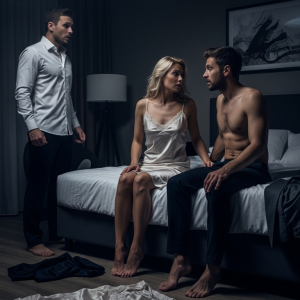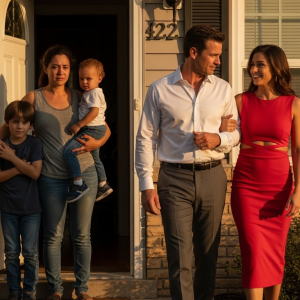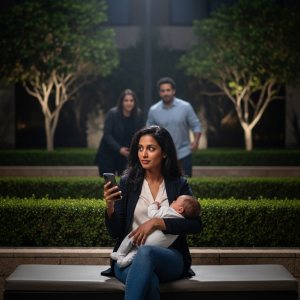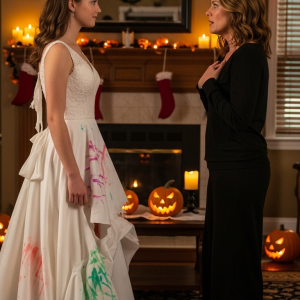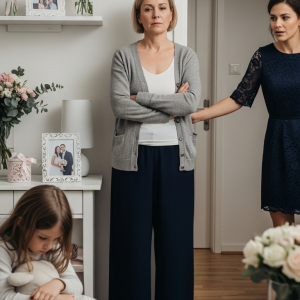My parents kicked me out at eighteen with no money and no support. Ten years later, they showed up on my doorstep, homeless and begging. What I said to them right there, at that door, changed everything.
I still remember the day it happened with perfect, chilling clarity. I was eighteen, an adult on paper but a kid in every way that mattered. Graduation had just passed, and I naively assumed I had the summer to figure things out—find a part-time job, maybe enroll in community college. Normal things. My parents, however, had other plans.
The day started like any other. I woke up late and was lounging in my pajamas when my mom called me into the kitchen around 5 PM. I figured it was for a chore I’d forgotten. Instead, I found them both sitting at the table, waiting. My dad’s arms were crossed over his chest like a fortress. My mom wore a strange, unreadable expression. The air was thick with a tension I could taste.
“Sit down,” my dad commanded. His voice was flat, devoid of warmth. I sat, the feeling of being summoned to the principal’s office washing over me.
He leaned back, a man settling in for a conversation he’d already rehearsed. “So, you’re eighteen now,” he stated, more of a confirmation than a question.
I blinked. “Yeah.”
“Well,” he continued, “you’re an adult. And adults need to learn to stand on their own two feet.”
I was completely lost. My mom jumped in, her voice crisp and business-like. “We’ve provided for you for eighteen years. That’s more than enough. It’s time for you to figure things out on your own.”
The words hung in the air, so absurd I almost laughed. “What… what are you saying?” My voice cracked. “Are you kicking me out?”
My dad shrugged, a gesture of profound indifference. “It’s called responsibility. You’re old enough to take care of yourself now.”
Let me tell you about my parents. They weren’t abusive in the conventional sense. They never hit me. But they were cold, transactional people. My father constantly complained about how expensive I was, as if I were a debt he was eager to clear. To my mother, I was a chore, an obligation she had to manage. I was never their child; I was their responsibility, and my eighteenth birthday was the final payment.
“But I don’t have a job yet,” I pleaded, the lump in my throat growing. “I just graduated.”
“That’s your problem,” my dad said, without a flicker of emotion.
“My problem?” I repeated, my voice shaking. “How am I supposed to pay for rent? For college?”
“You’ll figure it out,” he said, completely unfazed. “We had to, and so will you.”
My mom then tried to soften the blow with a line so twisted it made my head spin. “We’re doing this because we love you. You need to learn to be independent.”
Love? That wasn’t love. It was abandonment, wrapped in a cheap, self-serving justification.
“Can I just stay until I find a job?” I tried to reason. “I can help with rent.”
“No,” my dad said firmly, the word a slamming door. “You have one month to pack your things and leave.”
That was it. No discussion. No compromise. Just an eviction notice from the two people who were supposed to be my safe harbor. That night, locked in my room, I didn’t cry. I was too shocked. The house I’d lived in my whole life suddenly felt alien. Through the door, I could hear the faint sound of the TV—my parents, watching their evening shows as if they hadn’t just detonated their only child’s life.
The next month was a blur of panic. I picked up every shift I could at my grocery store job, applied for loans with brutal interest rates, and scoured apartment listings. I found a tiny, dilapidated studio on the edge of town. It smelled of mildew and the neighbors were loud, but it was all I could afford.
On the day I moved out, they didn’t help. They didn’t even say goodbye. My dad sat on the porch, sipping a beer, watching me haul box after box to my friend’s beat-up car. My mom never came out of the house. As I got in the car to leave forever, he didn’t even look at me. He just raised his bottle slightly and said, “Good luck.”
The words echoed in my head as we drove away. Not “we love you.” Not “call us if you need anything.” Just… good luck.
That first year was pure survival. The tiny studio apartment was a dump. The walls were cracked, the shower had two settings—ice cold or scalding hot—and my furniture consisted of an upside-down milk crate and a ratty futon I bought for $10. I got good at living cheap. My diet was ramen, rice, and whatever was on sale at the grocery store where I worked every shift they’d give me.
When I wasn’t working, I was trying to get into school. My dream was tech, but college was a mountain I had to climb alone. I enrolled part-time at the local community college. The schedule was brutal. I’d wake up at 5 AM to open the store, work an eight-hour shift, then head straight to campus. I’d get home around 10 PM, dead on my feet, and force myself to study. Some nights, I’d fall asleep sitting up, my face illuminated by the glow of my laptop.
I was constantly tired, stressed, and broke. One night, about a year in, I was sitting on that smelly futon, shivering in two hoodies because the heating barely worked, and I just started laughing. A wild, unhinged laugh at the sheer absurdity of my life. For a fleeting moment, I thought about calling my parents. Maybe they felt guilty. But the memory of that cold kitchen table, of their indifferent faces, extinguished any flicker of hope. They didn’t care, and I refused to give them the satisfaction of seeing me fail.
That bitterness became my fuel. I envied kids whose parents helped them, who could focus on school without working two jobs just to survive. That envy hardened into resolve. I had something to prove, not to them, but to myself.
By twenty-one, I had my associate’s degree. I transferred to a state university, commuting from my crappy apartment and working two jobs to make it happen. I graduated at twenty-four. I still remember staring at the job offer on my laptop screen—a junior position at a tech company. For the first time in six years, I felt like I could finally breathe.
That first real paycheck felt like a miracle. I moved into a clean, quiet apartment. I bought real furniture. A year later, at twenty-six, I bought my first house. It was a modest two-bedroom, but it was mine. Walking through that door, I felt an overwhelming sense of victory. I had built a life from the wreckage they had left me in, without a single ounce of their help. They knew none of this. As far as I was concerned, they were ghosts from a past life.
For years, there was only silence. Then, when I was twenty-eight, I got a call from my aunt. Her voice was strained.
“I thought you should know,” she started, bracing herself. “Your parents lost the house.”
I was stunned into silence. My father, the man who lectured me endlessly about financial responsibility, had lost everything.
“What happened?” I finally asked.
“Your dad got into a bad business deal,” she explained. “Thought he could make a quick profit, but it backfired. He was sued. They took everything—the house, the savings. Gone.”
“What are they doing now?”
“Staying with friends,” she said carefully. “But it’s not a long-term solution. They don’t have anywhere to go.” I could hear the unspoken question in her voice. They need help.
“Me?” I cut her off, a short, sharp laugh escaping my lips. “Why on earth would I help them?”
“They’re still your parents,” she said quietly, as if that simple fact erased a decade of abandonment.
“They didn’t care when I needed help,” I said flatly. “They made their choice.”
A few weeks later, on a Saturday morning, there was a knock at my door. I opened it and froze. It was them. Ten years had not been kind. My father, once so imposing, looked smaller, worn down. My mother, who always prided herself on her perfect appearance, looked disheveled and pale.
“We need to talk,” my dad said, his voice strained.
I didn’t move. I just crossed my arms and leaned against the doorframe.
My mom’s voice trembled. “We lost the house. We… we don’t have anywhere to go.”
I tilted my head. “Yeah, I heard.”
“We thought… maybe we could stay here,” she blurted out. “Just for a little while. Until we get back on our feet.”
I couldn’t help it. I laughed. Not a bitter laugh, but one of pure, genuine disbelief. “You’re joking, right?”
My dad’s face tightened. He wasn’t used to being the one asking for help. “We don’t have anyone else to turn to,” he said, his voice growing tense.
“And I’m supposed to care now?” I shot back.
“We’re your parents!” he snapped, the entitlement in his voice staggering. “You owe us.”
That was it. That was the line.
“Owe you?” I asked, shaking my head in amazement. “You threw me out at eighteen with nothing. You didn’t care if I ended up homeless. And now you show up here expecting me to save you?”
“We didn’t have a choice!” my mom cried.
“Neither did I!” I roared, years of suppressed anger bubbling to the surface. “I had to figure it out on my own, and I did. So what makes you think you get to just walk back into my life now?”
Seeing their shattered faces, I felt nothing. No sympathy. No guilt. Only the cold, hard certainty that I had been right to cut them off.
“You should have thought about that before you threw me out,” I said, my voice dropping to a calm, steady tone. “I’m not your backup plan.”
My dad’s face turned red with fury. My mom just sobbed quietly.
I looked them both in the eye. “Good luck,” I said flatly. And then I closed the door in their faces.
I expected to feel something after I closed the door—regret, maybe even guilt. Instead, all I felt was a profound sense of calm. They had made their bed, and now they had to lie in it.
But they didn’t give up. The next day, the calls and texts began. “Please, we have nowhere to go.” “We’re still your parents, you can’t just leave us out here.” I ignored them all. Then my aunt called, then cousins, then distant relatives I hadn’t spoken to in years. My parents had launched a full-scale guilt campaign, painting me as a cold-hearted monster who was abandoning them in their time of need.
A few actually took their side. A cousin texted me, “Dude, that’s cold. You can’t just leave them homeless.”
I typed back instantly. “Where were they when I was working two jobs and eating ramen for three years? They didn’t care then. Why should I care now?” He didn’t reply.
Then, about a week later, I came home to find a thick, official-looking envelope in my mailbox. It was a legal notice. My parents had hired a lawyer. They were attempting to use a rare and obscure “filial responsibility” law to legally force me to support them.
The sheer audacity was breathtaking. I immediately called my lawyer, who, after a quick review, told me not to worry.
“They’re trying to scare you,” he said. “But they don’t have a leg to stand on. The fact that they abandoned you at eighteen would get them laughed out of any courtroom.” He drafted a response making it clear I was under no obligation and added that if the harassment continued, we would pursue a restraining order.
That seemed to be the end of the legal threats, but not the emotional ones. A few nights later, an email from my mom appeared in my inbox. It was a long, rambling sob story, detailing their hardships. But it was the last line that struck me.
“You might not believe it, but we always loved you. We did what we thought was best.”
That sentence tightened my chest with pure, unadulterated anger. They were trying to rewrite history, to frame their cruel abandonment as an act of love. I wasn’t going to let them. I didn’t reply. I marked the email as spam and deleted it.
Months passed in silence. My aunt eventually told me my parents had moved into a small rental apartment across town. My dad had found some work, and my mom was cleaning houses. I felt nothing hearing this. No pity, no satisfaction. It was just information.
Then one day, a small package arrived. No return address. Inside was an old photo of me as a child, grinning on a brand-new bike. Tucked behind it was a short, handwritten note from my mom.
“We’re sorry for everything. We hope you’re doing well. We just wanted you to know that we’re proud of you.”
That was it. No begging. No excuses. Just that. I stared at the note for a long time. It didn’t change anything, but for the first time, the anger I felt toward them was gone. In its place was just… an emptiness. A quiet finality. I put the photo and the note in a drawer and closed it.
These days, I don’t think about my parents much. I have my house, my career, and my peace. People sometimes ask if I regret not helping them. The answer is always no. They made their choice, and I made mine. I am not a bad person for protecting the life I fought so damn hard to build.
To anyone who has been through something similar, know this: It’s okay to say no. It’s okay to put yourself first. You don’t owe anything to the people who broke you. You deserve peace. You deserve happiness. It is not your responsibility to fix them. It never was.
